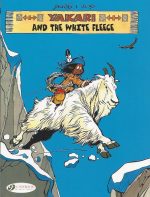
By Derib & Job, coloured by Dominique, translated by Erica Jeffrey (Cinebook)
ISBN: 978-1-84918-055-9
In 1964 Swiss journalist André Jobin founded a new children’s magazine entitled Le Crapaud à lunettes. He then wrote for it under the pseudonym Job. Three years later he hired fellow French-Swiss artist Claude de Ribaupierre who opted for the pen-name “Deribâ€. His own career began when he joined Studio Peyo (home of Les Schtroumpfs), as an assistant working on Smurfs strips for the weekly Spirou. Together, Jobin and de Ribaupierre crafted the splendid Adventures of the Owl Pythagore before striking pure comics gold a couple of years later with their next collaboration.
Launching in 1969, Yakari detailed the life of a young Oglala Lakota boy on the Great Plains; sometime after the introduction of horses by the Conquistadores and before the coming of the modern White Man.
Overflowing with gentle whimsy and wholesome suspense, the beguiling strip explores a captivating, bucolic existence at one with nature and generally free from strife. For the sake of our entertainment however the seasons are punctuated with the odd crisis and generally resolved without fame or fanfare by a little Sioux lad who is smart, compassionate, brave… and able to converse with all animals…
Derib – equally excellent in both enticing, comically dynamic “Marcinelle†cartoon style yarns and with devastatingly compelling meta-realistic action illustrated action epics – went on to become one of the Continent’s most prolific and revered creators.
It’s a crime that such groundbreaking strips as Celui-qui-est-né-deux-fois, Jo (the first comic on AIDS ever published), Pour toi, Sandra and La Grande Saga Indienne) haven’t been translated into English yet, but we remain in a state of hopeful anticipation…
Many of his most impressive works over the decades have featured his beloved Western themes, magnificent geographical backdrops and epic landscapes, and Yakari is considered by most fans and critics to be the feature which catapulted him to deserved mega-stardom.
Originally released in 1984, Yakari et la toison blanche was the eleventh European album and Cinebook’s lucky 13th, but chronology and continuity addicts won’t suffer unless they are of a superstitious turn of mind since this tale is both stunningly simple and effectively timeless; offering certain enjoyment from a minimum of foreknowledge…
The tribe are nomadic; perpetually moving with the seasons and this tale opens as they make camp at the base of a mighty mountain range. Two warriors leave to round up wild mustangs but as they scale the lower ranges, over-eager Bold Crow ignores an omen and is attacked by a golden eagle. The diving raptor knocks him from his pony and, while he lies stunned, snatches away his medicine pouch and personal talisman.
Playfully scaling the rocks nearby, Yakari, Rainbow and blustering Buffalo Seed see Watchful Snake bringing comatose Bold Crow back and rush to see what has happened…
Even medicine man He Who Knows cannot wake the fallen hunter, and Yakari is worried that somehow his own totem Great Eagle has caused the tragedy. Determined to intercede on the fallen warrior’s behalf and recover the stolen pouch, Yakari sets off to climb the mountain on his wondrous pony Little Thunder.
Eventually, though, even the wonder horse can no longer keep his footing and after conferring with a helpful elk and a timid clan of marmots the little lad heads on alone, always aiming for the highest peak where the eagles live…
Nearing the top Yakari spots the giant bird of prey and with some relief realises it is not his adored Great Eagle who has caused the injury to Bold Crow’s spirit. Before he can decide what to do next however, the bold boy is distracted by strange sounds and sees a herd of mountain sheep playfully butting heads.
From his vantage point the weary boy can see his people far below and for miles around. It’s the only thing that saves him as the weather suddenly changes and an ice storm hits. Unable to climb down in the tempest, he heads for a cave higher up the rock face and frantically scrabbles in. With snow pounding down he crawls as far as he can through the darkness and falls asleep in the withering cold…
He awakes alive, surprised and gloriously warm, to find himself at the centre of a huge heap of smiling, fleecy mountain goats. Over breakfast he tells the welcoming family of his quest. They too have reason to be wary of the great raptor, as it has been know to menace newborn kids and generous Broken Horn offers to guide him as close as she can…
Sadly even carrying Yakari, they cannot get close enough to the inaccessible eagle’s eyrie and have to retreat. Rather than admit defeat however, the lad has a plan, but it all rests upon his ability to weave and braid the fleeces shed by his new friends into a certain form…
Now all that remains is to regain the summit, brave the hunter’s lair and survive the inevitable counterattack, but at least thanks to a last-minute arrival, the goats are not his only allies in the deadly heights…
Always visually spectacular, seductively smart and happily heart-warming, Job’s beguiling script again affords Derib a splendid opportunity to go absolutely wild with the illustrations; creating a dizzying, breathtaking scenario which only makes his eventual victory even more unlikely until it actually happens…
The exploits of the valiant voyager who speaks with beasts and enjoys a unique place in an exotic world is a decades-long celebration of joyously gentle, marvellously moving adventure, honouring and eulogising an iconic culture with grace, wit, wonder and especially humour.
These seductive sagas are true landmarks of comics and Yakari is a strip no parent or fan of graphic entertainment should ignore.
Original edition © Le Lombard (Dargaud- Lombard S.A.) 2000, by Derib + Job. English translation 2010 © Cinebook Ltd.
